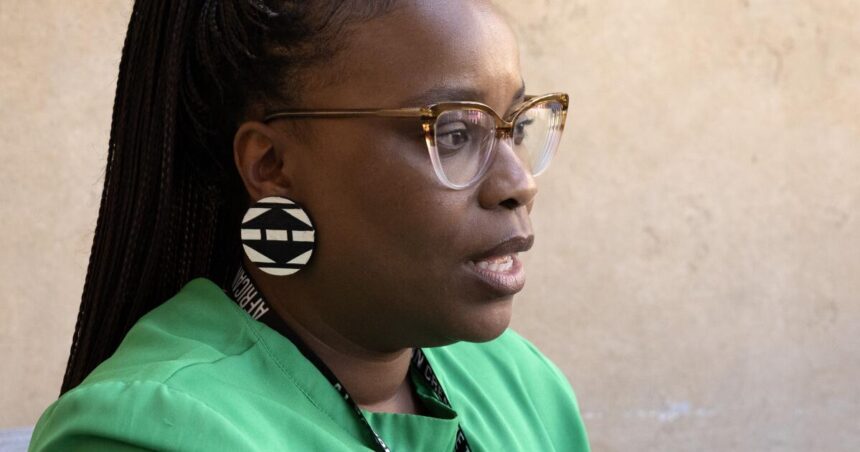Filmmaker Becky Muikia carries the stories of her native Kenya with her wherever she goes.
They came with her to NBA All-Star Weekend, where her media and communications company aired a show about a Kenyan women’s basketball team battling gender norms.
Then this summer, they traveled to Los Angeles, where Muikia participated in a program hosted by USC’s School of Cinematic Arts, which paired experienced African filmmakers with Hollywood professionals for a five-week cultural exchange of sorts designed to teach each group about their respective film industries.
“We don’t have to change who we are or the context of those stories for them to travel,” Muikia, 42, said, sitting on a patio at the University of Southern California. “That resonates so strongly with us here. Being in this market, we realize that we don’t have to change our local stories to make them global stories.”
The success of global TV shows like Netflix’s “The Squid Game” proves the concept, making international productions a worthwhile gamble for studios. It’s also a key area of interest for the U.S. State Department, which has funded a program at USC known as African Creative TV.
The program is supported by a long-term grant called the American Film Showcase, which promotes film and television as a form of diplomacy, and is one of several initiatives the State Department funds at USC. (It’s difficult to keep track of the total amount the State Department spends on film diplomacy, but American Film Showcase grants awarded to USC typically run for 18 months to two years and amount to about $2 million.)
Movie diplomacy is not a new concept. During World War II, Hollywood was an integral part of the Office of War Information, which commissioned directors to make films (considered to be propaganda) aimed at encouraging patriotism at home and inciting the American public to support the war effort.
Abroad, U.S.-owned media outlets such as Voice of America and Radio Free Europe were used during the Cold War to broadcast news and programs that promoted positive views of the United States, said Alexandra Macias, a political science professor at California State University, Northridge.
Unlike so-called hard power postures that involve building up military forces and stockpiles of ammunition and weapons to deter global rivals, these kinds of “soft power” diplomatic moves take a more subtle approach. While the end goal is the same — improving global opinion of the United States and thereby strengthening national security — the two approaches work in tandem to achieve that goal, she said.
“You can’t base your security solely on strong munitions or military power,” Macias said. “You also have to understand, deep down, that if it doesn’t anger other countries, it’s to your advantage.”
The African Creative Television Program was launched after President Biden met with the president to discuss health and economic issues. In a statement, a State Department spokesman said, “By funding this program, the U.S. government is seeking to boost entertainment industry jobs and stimulate African economies.”
“We get to have conversations with people who are in the rooms we want to be in, who have dealt with the budgets we’re trying to break through, and who are running the show the way we want to,” said Muikia, who has been in the Kenyan entertainment industry for 20 years.
Already, U.S. entertainers are increasingly working with other U.S. media and entertainment companies, including Disney, Netflix, Paramount, NBCUniversal, Sony and YouTube, to “foster the growth” of the country’s overall creative industries, the State Department spokesman said.
“Through film diplomacy, we support broader U.S. foreign policy goals of expanding the creative economy and economic equity through social opportunity and inclusion,” the statement said. “Movies and television don’t just provide entertainment, they also provide an outlet to highlight issues, start conversations about difficult topics, and give voices to those we may not hear.”
In addition to African creative television, USC also partners with the State Department on Middle East media efforts, with representatives from the school making 30 to 40 trips a year at the government’s request. USC staff take filmmakers to different countries to screen their work and host discussions and workshops. (The university has participated in State Department-led cultural exchange programs for more than 15 years.)
Topics vary, but include science, technology, engineering and math-related films such as the 2022 Mars rover documentary “Good Night Oppy” and 2019’s “Women in Motion,” about “Star Trek” actor Nichelle Nichols. Demand is high. Over the years, films about press freedom, sports and women’s rights have also been shown, said Alan Baker, associate dean for international projects and management at the USC School of Cinematic Arts.
The film doesn’t necessarily paint the U.S. in a positive light. Baker once screened a documentary in Malawi called “Undefeated,” about a country trying to overturn a losing record. At the end of the screening, one viewer remarked that after watching the film and seeing the hardships the student athletes went through, he realized America has problems, too, Baker said.
“It was a really life-affirming moment, certainly for me and for the filmmakers,” Baker said.
Back at USC, on a weekday morning in August, a dozen visiting African filmmakers and screenwriters debated which Hollywood concepts and practices they would like to see adopted by the industries back home, and which ones wouldn’t work.
Creative trade unions, for example? There may not be a place for them in Kenya right now, but Muikia thought, maybe there was a way to incorporate the sense of community they fostered into the film industry.
What about developing a single show over multiple years, as is common in the US? “For us it’s a question of budget,” one filmmaker said, adding that multiple shows could be developed over the three-year process.
In between, the filmmakers and their lecturer, TV writer and director Desta Tedros Lev, swapped notes about their favorite English-language shows, including BBC America’s thriller “Killing Eve,” sci-fi masterpiece “Battlestar Galactica” and HBO’s fantasy epic “Game of Thrones.”
“I’ve always been curious about what the process is specifically in Hollywood and how different it is from how we make things in Nigeria,” said Isioma Osaje, the Nigerian producer, writer and director of the time-loop comedy film Japa! on Prime Video. “It’s really nice to see that the story is essentially the same and that the themes that resonate with Nigerians can also resonate here. It’s all about refinement and streamlining.”
Muikia, the Kenyan producer, said he learned more about the economic woes plaguing the U.S. film and TV industry, which broadened his thinking about how to get African stories out to the world, through YouTube and perhaps even his homegrown video demand platform.
“We may not have someone from the outside coming in and telling us the solutions,” she said. “The biggest thing for us was reaffirming the fact that we have to create some of these things ourselves.”









